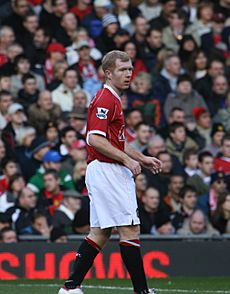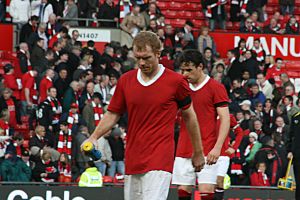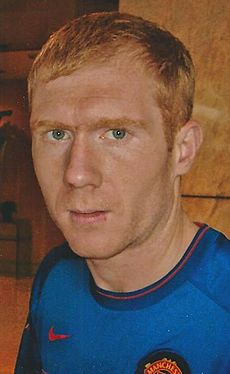Paul Scholes facts for kids
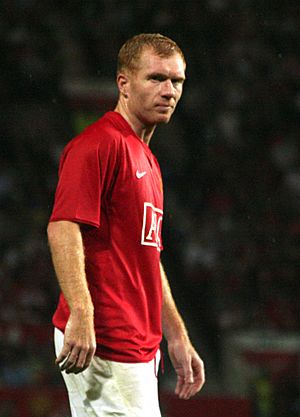
Scholes playing for Manchester United in 2008
|
|||
| Personal information | |||
|---|---|---|---|
| Full name | Paul Scholes | ||
| Date of birth | 16 November 1974 | ||
| Place of birth | Salford, England | ||
| Height | 5 ft 6 in (1.68 m) | ||
| Position(s) | Midfielder | ||
| Youth career | |||
| Langley Furrow | |||
| 1991–1993 | Manchester United | ||
| Senior career* | |||
| Years | Team | Apps | (Gls) |
| 1993–2011 | Manchester United | 466 | (102) |
| 2012–2013 | Manchester United | 33 | (5) |
| 2018 | Royton Town | 2 | (0) |
| Total | 501 | (107) | |
| International career | |||
| 1993 | England U18 | 4 | (1) |
| 1997–2004 | England | 66 | (14) |
| Managerial career | |||
| 2015 | Salford City (caretaker) | ||
| 2019 | Oldham Athletic | ||
| 2020 | Salford City (interim) | ||
| *Club domestic league appearances and goals | |||
Paul Scholes is a famous English football player, coach, and TV expert. Born on November 16, 1974, he is known as one of the best midfielders ever. Scholes played his entire professional career for Manchester United. He scored over 150 goals in more than 700 games between 1993 and 2013.
Paul Scholes won an amazing 25 trophies with Manchester United. These include 11 Premier League titles, three FA Cups, and two UEFA Champions League titles. He was famous for his amazing skills, accurate passes, smart movement, powerful long-range shots, and ability to score goals.
Scholes grew up in Manchester United's youth academy. He was part of a special group of young players called "Fergie's Fledglings," named after their manager Alex Ferguson. He played his first full game in the 1994–95 season. He went on to play 718 games for the club, which is the third-highest number of appearances for any player. He first retired in May 2011 and became a coach. But he missed playing and returned in January 2012 for one more season before retiring again in May 2013.
Paul also played for the England national team from 1997 to 2004. He played 66 games and took part in the 1998 and 2002 FIFA World Cups. He also played in the UEFA European Championships in 2000 and 2004. He stopped playing for England in August 2004 to focus on his family and club career.
Contents
Early Life and Football Dreams
Paul Scholes was born in Salford, England, on November 16, 1974. His family moved to Langley when he was very young. He went to St Mary's RC Primary School and first played for a team called Langley Furrow. Paul was also very good at cricket!
When he was 14, he started training with Manchester United. He officially joined as a trainee in 1991 after leaving school. In his last year of school, he was even chosen to play for the Great Britain National Schools football team.
Club Career: A United Legend
Starting Strong: 1993–1999
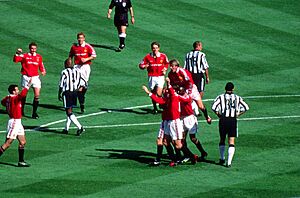
Paul Scholes was part of the Manchester United youth team that reached the final of the FA Youth Cup in 1992–93. He became a professional player on July 23, 1993. He really started playing for the main team in the 1994–95 season, where he played 17 league games and scored five goals.
His first game was on September 21, 1994. He scored two goals in a 2–1 win against Port Vale in the League Cup. Just three days later, he played his first league game against Ipswich Town. He scored a goal in that game too, even though United lost 3–2.
In the 1995–96 season, Scholes got more chances to play. He scored 14 goals in all competitions. Manchester United became the first English team to win both the league and the FA Cup twice! He also won another Premier League medal in the 1996–97 season.
In the 1998–99 season, Scholes was a very important player for Manchester United. They achieved a historic "treble," winning the Premier League title, the FA Cup, and the UEFA Champions League. He scored one of United's two goals in the FA Cup final against Newcastle. He also scored a key goal against Inter Milan in the Champions League quarter-final. Sadly, he missed the Champions League final against Bayern Munich because of a yellow card suspension.
Key Player: 1999–2007
During the 1999–2000 season, Scholes scored one of his most amazing goals against Bradford City. David Beckham took a corner kick directly to Scholes, who was waiting at the edge of the penalty area. Scholes volleyed the ball into the net perfectly! A week later, he scored his first "hat-trick" (three goals in one game) against West Ham United in a huge 7–1 win.
In the 2002–03 season, Scholes scored a career-high 20 goals in all competitions. This included another hat-trick in a 6–2 victory against Newcastle.
Scholes scored the winning goal in the 2003–04 FA Cup semi-final against Arsenal. He then played in the final, which United won 3–0 against Millwall. This was his last FA Cup medal. He also played in the 2005 FA Cup final, but United lost to Arsenal in a penalty shoot-out.
In the 2005–06 season, Scholes had to stop playing for a while because of blurred vision. People were worried it might end his career. But he recovered and played in United's last game of the season.
On October 22, 2006, Scholes played his 500th game for United in a 2–0 win over Liverpool. He became only the ninth United player to reach this milestone. The 2006–07 season was one of his best. He was even chosen for the PFA Team of the Year.
Later Years and Retirement: 2007–2011
In October 2007, Scholes hurt his knee and was out until January 2008. On April 23, 2008, he played his 100th Champions League game against Barcelona. He then scored the only goal in the second game, a powerful shot from 25 yards, which sent United to the Champions League final! United won the final against Chelsea in a penalty shoot-out.
Scholes was added to the English Football Hall of Fame in September 2008. On April 22, 2009, he played his 600th game for United.
On February 16, 2010, Scholes scored his 25th Champions League goal against AC Milan. This made him the highest-scoring central midfielder in Champions League history! On March 6, 2010, he became the 19th player in Premier League history to score 100 goals.
Scholes started the 2010–11 season very well. He scored his 150th goal for United in a 2–2 draw against Fulham on August 22. He was also named the Premier League Player of the Month for August 2010.
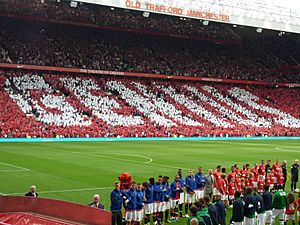
On May 28, 2011, Scholes played as a substitute in United's Champions League final loss to Barcelona. Three days later, he announced he was retiring from playing and would join the club's coaching staff. On August 5, United held a special "testimonial match" to celebrate his 17 years at the club. United won the game 6–0, with Scholes scoring the first goal from 25 yards.
Coming Back: 2012–2013
After training with United's reserve team, Scholes decided he wanted to play again. He talked to Alex Ferguson, and on January 8, 2012, he made a surprise comeback as a substitute in a 3–2 FA Cup win against rivals Manchester City.
He scored his first goal since returning in the next game, a 3–0 win against Bolton Wanderers. This meant he had scored at least one goal in every Premier League season since 1994–95! On September 15, 2012, he played his 700th game for Manchester United and scored in a 4–0 win against Wigan Athletic. This goal meant he had scored in his 19th straight Premier League season, a record only beaten by his teammate Ryan Giggs.
On May 11, 2013, Scholes announced his second and final retirement from football. He played his last professional league game on May 19, 2013, against West Bromwich Albion.
A Brief Return to Royton Town
In August 2018, at 43 years old, Scholes briefly came out of retirement again. He played a match for his son Arron's team, Royton Town, in a local league. He played two more games for them before stopping again.
International Career: Playing for England
Scholes played four games for the England under-18 team in 1993, scoring one goal. He was part of the England team that won the 1993 UEFA European Under-18 Championship.
He made his debut for the England senior team on May 24, 1997. He scored his first goal for England in his second game, a 2–0 win against Italy. He was chosen for the England squad for the 1998 FIFA World Cup. He scored a goal in England's first World Cup group match against Tunisia.
On March 27, 1999, Scholes scored a hat-trick for England against Poland. He also scored both goals in England's 2–0 win against Scotland in the UEFA Euro 2000 play-off, helping England qualify for the tournament.
Scholes became a very important player in England's midfield. However, before Euro 2004, he was often played out of his usual position on the left side of midfield. He announced his retirement from international football in August 2004, saying he wanted to spend more time with his family and focus on Manchester United.
Later, both Steve McClaren and Fabio Capello, who were England managers, asked Scholes to come back and play for England. But he said no both times, still wanting to focus on his family.
How Paul Scholes Played
His Style of Play
Paul Scholes was admired for his amazing technical skills. He was known for his accurate passing, smart movement, and powerful shots from far away. Even though he started as a striker when he was younger, he became a very well-rounded and versatile midfielder. He could play in many different midfield roles, like defensive, attacking, or wide.
Scholes was great at making late runs into the attack and linking up with his teammates. He also had an excellent ability to understand the game and control how fast the play moved. This meant he could play deep in midfield, starting attacks, or run all over the field from "box-to-box." He had an incredible range of passes and often started dangerous attacks after winning the ball back.
Scholes himself admitted he wasn't super fast or great at dribbling. He said his calmness and ability to keep the ball under pressure came from being smart, having great awareness, and working well with others.
Sometimes, Scholes received criticism for his tackling. Some people, including Scholes himself, said his tackles were often clumsy. Others wondered if some of his tackles were meant to be harsh.
What Others Said About Him
Many famous football players, like Ronaldinho, Andrés Iniesta, Luís Figo, and Xabi Alonso, have said how much they admired Paul Scholes' talent. Some of his former teammates, including Cristiano Ronaldo and Wayne Rooney, have called him the best player they ever played with.
Sir Bobby Charlton, a Manchester United legend, said, "Paul is always so in control and pin-point accurate with his passing – a beautiful player to watch."
Zinedine Zidane, one of the greatest players ever, said Scholes was his toughest opponent: "He is the complete midfielder. Scholes is undoubtedly the greatest midfielder of his generation."
Thierry Henry, a famous Arsenal player, said in 2009, "Without any doubt the best player in the Premiership has to be Paul Scholes. He knows how to do everything, and he is the one who directs the way his team plays."
His teammates even nicknamed him 'SatNav' (short for Satellite Navigation) because his long passes were so accurate!
Xavi, a Barcelona and Spain midfielder, called him "the best central midfielder I've seen in the last 15, 20 years... He's spectacular, he has it all." Andrea Pirlo, another legendary midfielder, chose Scholes as the only English player in his dream Champions League team.
Sir Alex Ferguson, his long-time manager, called him "one of the greatest football brains Manchester United has ever had." Many people believe Scholes was one of the few English players who could truly control the game from midfield.
Life Outside Football
Football Ownership and Coaching
In 2014, Paul Scholes, along with other Manchester United legends like Gary Neville and Ryan Giggs, bought Salford City. Their goal was to help the club reach the Football League. They later sold half of the club to a billionaire named Peter Lim.
Scholes also helped coach the Manchester United first team for a short time in 2014. In January 2015, he and Phil Neville were temporary managers for Salford City for one game.
On February 11, 2019, Scholes became the manager of Oldham Athletic. However, he resigned just 31 days later, after winning only one of his seven games, due to disagreements with the club owner. In October 2020, he was appointed interim head coach of Salford City for a short period before a permanent manager was hired.
Media Work
In July 2014, Scholes became a football expert for BT Sport and also appeared on ITV's football coverage. He is known for his honest and direct opinions.
Endorsements and Other Projects
Scholes has appeared in EA Sports' FIFA video games and was on the cover of FIFA 2001. He also appeared in Nike commercials, including a famous "Secret Tournament" ad before the 2002 World Cup.
Along with other former United players, Scholes has helped propose a new university in Greater Manchester called University Academy 92. It aims to offer different types of courses and attract students who might not usually go to university.
Personal Life
Paul Scholes has asthma. He married his childhood sweetheart, Claire, in 1999. They live in Greater Manchester and have a daughter and two sons. Their younger son has autism. His daughter, Alicia Scholes, is a professional netball player for the England national team.
Scholes is known for being very private and not liking the "celebrity" side of professional sports. He once said his ideal day was "train in the morning, pick up my children from school, play with them, have tea, put them to bed and then watch a bit of TV." His former teammate Roy Keane praised Scholes for focusing only on his job as a footballer and avoiding the fame.
Honours
Manchester United
- Premier League: 1995–96, 1996–97, 1998–99, 1999–2000, 2000–01, 2002–03, 2006–07, 2007–08, 2008–09, 2010–11, 2012–13
- FA Cup: 1995–96, 1998–99, 2003–04
- Football League Cup: 2008–09, 2009–10
- FA Charity Shield/FA Community Shield: 1996, 1997, 2003, 2008, 2010
- UEFA Champions League: 1998–99, 2007–08
- Intercontinental Cup: 1999
- FIFA Club World Cup: 2008
England U18
- UEFA European Under-18 Championship: 1993
Individual Awards
- Jimmy Murphy Young Player of the Year: 1992–93
- Manchester United Goal of the Season: 2006–07
- Premier League Player of the Month: January 2003, December 2003, October 2006, August 2010
- PFA Team of the Year: 2002–03 Premier League, 2006–07 Premier League
- English Football Hall of Fame: 2008
- Premier League Hall of Fame: 2022
- FWA Tribute Award: 2012
See also
 In Spanish: Paul Scholes para niños
In Spanish: Paul Scholes para niños
 | Selma Burke |
 | Pauline Powell Burns |
 | Frederick J. Brown |
 | Robert Blackburn |


